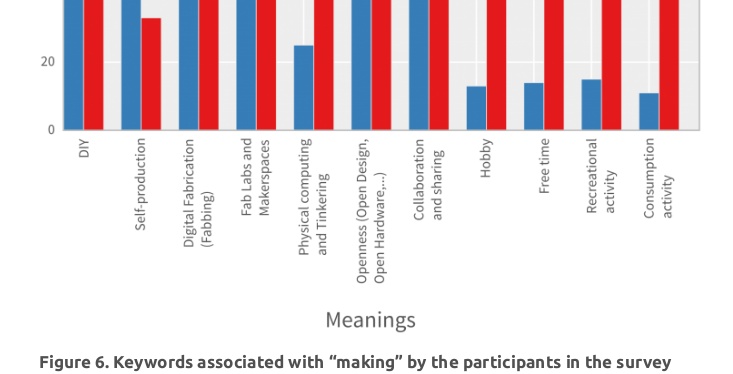Some evergreen insights from a survey on makers in Italy
Spoiler: they are not about technology.
Three years ago, a group of italian researchers investigated the knowledge, values and working dimensions of makers in Italy, comparing them with traditional designers and businesses.
The team sought to understand how much makers engaged in peer production or in traditional businesses, whether they work with open source and collaborative processes or individually, and whether their communities have a strong or weak role in their work.

Main outcomes of the survey
- Collaboration among italian makers comes mostly from the practical necessity to exchange and acquire technological skills, but it is also considered important as a principle. While openness is not considered the main trait of making, but makers activities have a strong relationship with it, and makers are aware of this.
- Making activities already were “more a job than a hobby”, but [in many cases] were still not completely sustainable, economically.
- Makers who participated to the survey were mostly self-employed working at home, in a craft workshop or in a Fab Lab, on self-funded or non-commercial initiatives, where technology is not the only critical issue.
- Italian Makers have a strong relationship with their localities and established industry.
- Participation in communities is relevant, but is more collaboration physically, in Maker Laboratories than in online communities.
The recurring themes? Pragmatism. And glocalism
It may seem obvious, especially three years later, but it cannot hurt to repeat it: the real potential of what is called “the Makers Movement” are its pragmatism, but above all strong connection with, and service of, local communities for which “technology is not the only critical issue”, and almost always not the first, or second. This is what I read hidden between all the lines of that survey. This is what you should take home too, and this is what national and local administrations everywhere should actively support.
Speaking of further research…
The researchers also concluded that:
“Further research is needed on the topics of peer production with physical goods and on the topic of policies that could improve the working condition of Makers in order to be more sustainable."
I happen to have participated just in one of those “further researches”, in the same years: the DiDIY (Digital DIY) EU H2020 project, that investigated the long term socio-economic impacts of distributed, DIY digital manufacturing, producing, among other things, policy recommendations to support such activities for the common good. All the results of our research are available on the website, so… please read them, and let me know what you think.
Who writes this, why, and how to help
I am Marco Fioretti, tech writer and aspiring polymath doing human-digital research and popularization.
I do it because YOUR civil rights and the quality of YOUR life depend every year more on how software is used AROUND you.
To this end, I have already shared more than a million words on this blog, without any paywall or user tracking, and am sharing the next million through a newsletter, also without any paywall.
The more direct support I get, the more I can continue to inform for free parents, teachers, decision makers, and everybody else who should know more stuff like this. You can support me with paid subscriptions to my newsletter, donations via PayPal (mfioretti@nexaima.net) or LiberaPay, or in any of the other ways listed here.THANKS for your support!